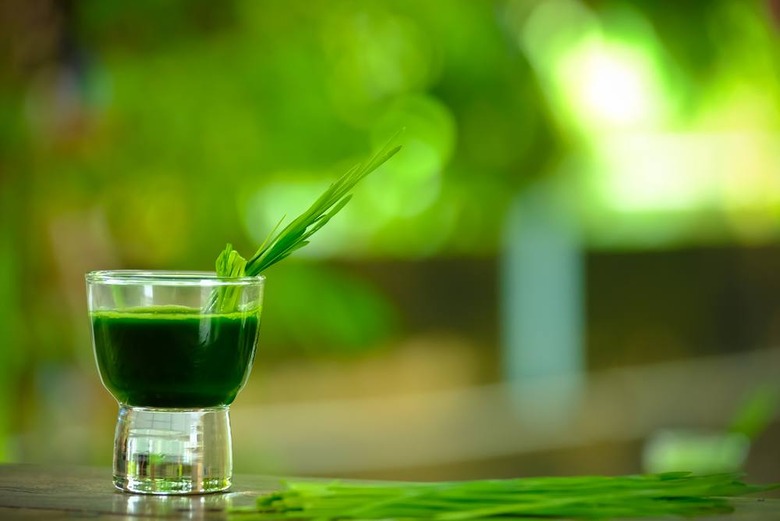Here's The Secret Behind Those Weird Wheatgrass Shots
Have you ever noticed that tray of what appears to be lawn trimmings behind the counter of your favorite smoothie bar? No, it's not there for aesthetics or feng shui. Wheatgrass (Triticum aestivum) is far from just your typical turf.
The young grass of the wheat plant has been used for thousands of years, starting with ancient Mesopotamian civilizations living within the area of land known as the Fertile Crescent (now the Middle East). It was only adopted by Western cultures in the 1930s as a result of experiments conducted by agricultural chemist Charles Schnabel. He supplemented the diets of ailing chickens with the fresh cut grass, and found that not only did they recover, but they produced eggs at a higher rate than expected. Even among healthy chickens.. Schnabel repeated his experiment and got the same results, which prompted a multi-million-dollar investment from Quaker Oats.
Schnabel's wheatgrass was originally sold as a powder, but now it is commonly sold as a juice (for around $2.99 an ounce) or tossed into smoothies (it goes particularly well with pear). Wheatgrass is nutritionally dense — each serving is packed with vitamins, minerals, carotenoids, phytonutrients, and amino acids. Proponents argue that a shot of the stuff can remedy common ailments like colds, coughs, and fevers, or that it can be used as a morning pick-me-up, but other sources cite the range of benefits as being much broader — from preventing tooth decay, bacterial infections, and grey hair to balancing cholesterol levels and assisting in digestion. Small-scale animal studies confirm some of these claims (wheatgrass was found to improve cholesterol and balance oxidative stress in rabbits).
But while some websites tout the purportedly amazing benefits of wheatgrass, none of these claims have been proven or confirmed by any sort of comprehensive human trials. One paper concedes that although the young grass of the wheat plant does contain chlorophyll, flavonoids, and vitamins C and E, "the advantages seen in the clinical trials need to be proved in larger studies before clinical recommendations for the public can be given." That being said, the study didn't find any adverse effects of taking shots of wheatgrass juice, and the limited evidence available does indicate that the stuff has some benefits. Give it a shot the next time you're at the smoothie bar and see what happens.
